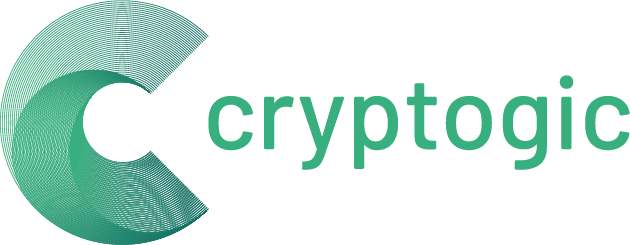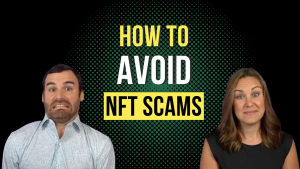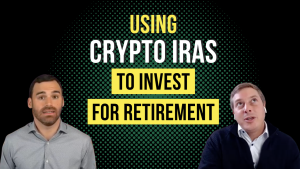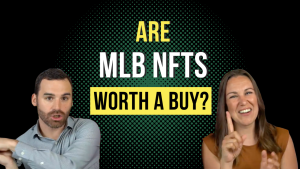Cryptogic provides tools, information, and commentary focused especially on cryptocurrencies, financial and cryptocurrency markets, economic trends, and trading strategies; these tools, information, and commentary are provided for general information purposes only. Neither Cryptogic nor any of its owners or employees are financial planners, investment advisors, or broker-dealers in any jurisdiction. Cryptogic does not provide investment advice, investment services, legal advice, legal services, tax advice, or tax services. Cryptogic does not contain, or constitute, and should not be interpreted as legal advice or opinion. Cryptogic is not a substitute for professional investment advice, tax preparation or legal advice. Consult an investment, tax or legal professional for specific advice about your situation. Click here to read our Website Terms of Use.
Should You Buy Magic: The Gathering NFTs?
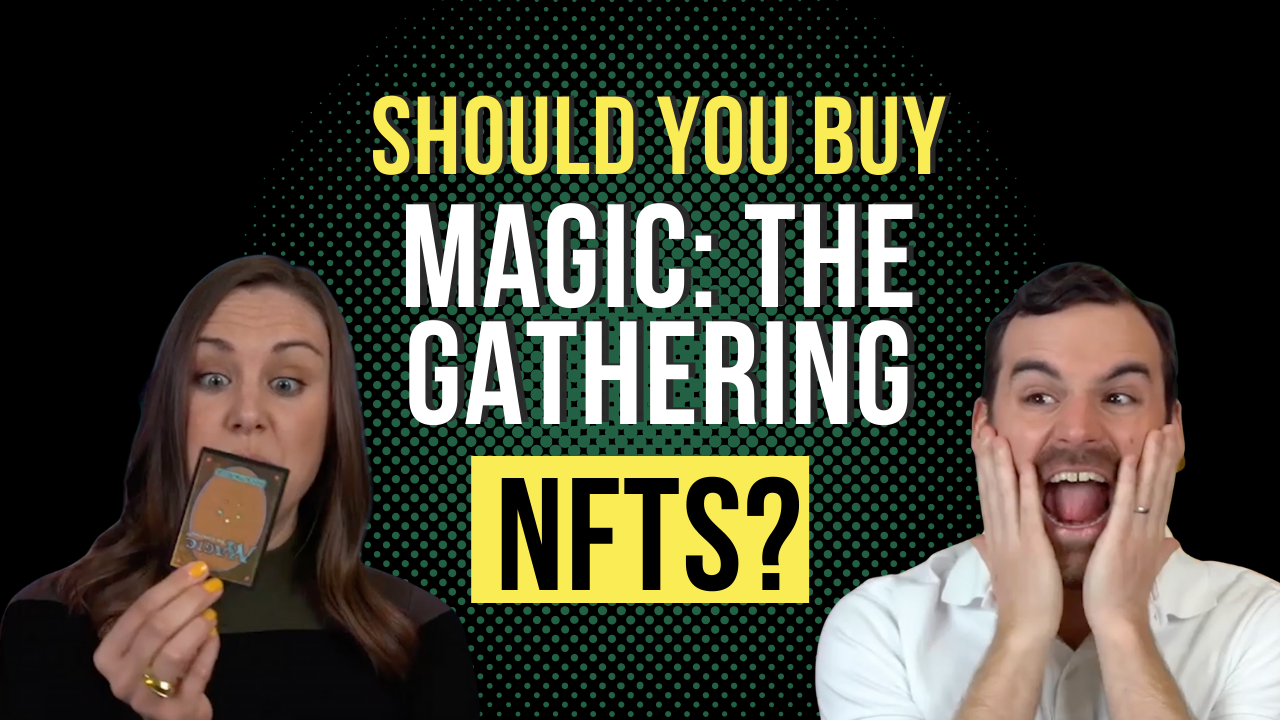
Magic: The Gathering (or MTG) is one of the most popular trading card games in the world, so naturally many collectors are wondering if it’s worth buying an MTG NFT. On this episode Scott and Heather discuss the current Magic: The Gathering NFT landscape, including what exists and what is fake.
Follow along to discover why official MTG NFTs (released by Wizards of the Coast) might be a buy for NFT collectors or investors.
Watch On YouTube
Episode Highlights
Unofficial Magic: The Gathering NFT project interrupted as WotC summon lawyers: Magic: “The Gathering publisher Wizards of the Coast has dropped the cease-and-desist hammer on an NFT project called mtgDAO, which is seeking to create its own parallel MtG format using NFTs based on real-world Magic cards. Wizards of the Coast, naturally, says the project is a clear violation of its copyrights and trademarks, and also suggests that it might have an NFT-based Magic project of its own in the works.” (PC Gamer)
Hasbro CEO says NFTs are being considered for Magic: The Gathering, other franchises: “NFTs are a real opportunity for us,” Goldner said. “As you know, we have so many brands that really operate on multiple demographic levels; whether it’s Transformers, whether it’s Magic and the D&D brand, and brands like G.I. Joe. We have a team that is leading our effort out of the west coast. We have our arms around this and see multiple opportunities on the NFT side, and you’ll hear more about that as we move forward. But we are actively developing our opportunities here, and we do see it as substantial.” (Polygon)
Connect With Magic: The Gathering
- Magic The Gathering Arena Official Website
- MTG on Facebook
- MTG on Instagram
- MTG on Twitter
- MTG on YouTube
- Wizards of the Coast on LinkedIn
About The Show
NFT Investor Nation is the show for passionate NFT traders, collectors and investors. Listen in as host Scott talks with leading NFT artists and entrepreneurs.
Connect With NFT Investor Nation
- Listen to NFT Investor Nation on Apple Podcasts
- Listen to NFT Investor Nation on Google Podcasts
- Listen to NFT Investor Nation on Spotify
- Visit our YouTube Channel
Transcript
Scott: Hi, I’m Scott.
Heather: And I’m Heather.
Scott: And welcome to “NFT Investor Nation.” Today, we’re going to be talking about “Magic: The Gathering,” MTG.
Heather: Oh my gosh.
Scott: I kind of wanted to go like, and I’m like, “Wait, that’s not Magic.”
Heather: No, it’s not magic. That’s “Game of Thrones.” It is “Game of Thrones,” but I must let everyone know that at the beginning of every episode, I do an interpretive dance in my living room to the opening music, it’s powerful. And I think in that same way, there’s sort of that like cult community around Magic in the same way there is with “Game of Thrones.”
Scott: Well, it’s fantasy.
Heather: Absolutely.
Scott: People love fantasy. And, well, I’m a “Magic: The Gathering” fan myself. I have a nice collection, and I like playing it. I’m probably going to play some tonight.
Heather: How often do you play?
Scott: I kind of don’t want to admit it on camera. Maybe four, five times a week.
Heather: I feel like anybody who’s watching this right now, they’re also in the same boat. I mean, in some ways, as somebody who doesn’t play magic, I feel like I’m probably the outsider.
Scott: Well, you know, really, and really, what happened is with the pandemic, the rise of webcam magic which allowed you to play Paper Magic with anybody around the world…
Heather: How cool.
Scott: …is so awesome because it used to be Tabletop Magic, which is great in person, and fortunately, in-person events are starting again. I’m going to be going to my first one in a couple of weeks here, I’m super excited about it.
Heather: That’s so exciting.
Scott: It’s going to be at a brewery, I think. It’s going to be a bunch of cool folks getting together and slinging cardboard.
Heather: That’s great. I mean, I only knew very little about it before I met you, but I feel like through you, I have learned about the incredible community that comes with “Magic: The Gathering,” and just friendships that have been forged. And like trading the cards through the mail, things like that, it’s just really…it’s really unique, it’s really cool.
Scott: I think so. I think so.
Heather: I am agreeing with you.
Scott: But we’re talking about Magic NFTs though.
Heather: Okay, let’s talk Magic NFTs.
Scott: Yeah. I guess the big question is why, right?
Heather: Well, and we’re already answering it. That community, that excitement.
Scott: It’s why. There’s this community, there’s that. There’s, again, kind of sound like a broken record here, but IP. There is that built-in aspect, and then, you have this collectible trading card game which people are all about. Look at this.
Heather: Are we having an unboxing?
Scott: Oh my gosh, of course. This is from Zendikar Rising, okay? And I honestly don’t even know if these are all from that. A buddy of mine sent me these. I was going to…
Heather: I was going to say, how do you not know where they’re from?
Scott: We have all sorts of islands. Do you want to hold some islands, Heather?
Heather: What does it mean? I do want to hold some islands.
Scott: They’re tapped from mana. We’ve got swamps, oh my gosh, we’ve got all sorts of stuff here. Okay, here we go. I wanted to get some creatures. Here’s a faerie, Latchkey Faerie, see? There’s all sorts of these. And you have built-in art, you have the functional aspect of it, you have rarity, you have collectibility, you have all of these elements that people are associating with NFTs.
And “Magic: The Gathering,” I mean, it’s been around since 1993, ’94, that’s primarily the format I play, is old school, so I have a lot of those cards from back in the earliest editions of Magic. That’s the format I choose to play. But there are so many options out there when it comes to Magic. And you have modern Magic.
Once again, Wizards of the Coast is the company that created “Magic: The Gathering.” They are now owned by Hasbro, the massive board game.
Heather: Who owns everything else.
Scott: That owns all the gaming things. Exactly. So yeah, another example of a huge, huge company with access to great IP and great games, and there’s just this natural thought of, well, if we have these great collectibles, if we have this great art, if we have exclusivity, well, why not NFTs?
Why not be able to buy an NFT, and maybe you can have a piece of this pie, so to speak?
Heather: And ultimately, because of the gamified nature of “Magic: The Gathering,” having them and then also trading them which is incredibly cool.
Scott: Exactly, which people love trading NFTs, they love collecting them and interacting with them, and then, again, there’s that utility. If you have a card that’s particularly rare or particularly powerful, that’s all gravy, that’s why there is this interest. I should say though, there is also a lot of pushback from within the Magic: The Gathering community on the concept of MTG NFTs because there’s a lot of this question, which I think is a valid criticism of well, if I have, whatever, this Stinkdrinker Bandit…
Heather: I’m glad you picked that one. I was going to go with the Ogre.
Scott: Yeah. This is the coolest one.
Heather: But the Stinkdrinker…
Scott: He’s a goblin rogue.
Heather: A goblin rogue.
Scott: He’s a goblin rogue. If I have this card, this is a physical card, in my possession, I have the art, I can go and play with my friend, I can play on…over Discord or whatever it might be, I can play a webcam game. Why would I need an NFT for this card? I think that there’s pushback in the community for why would that even happen?
Heather: But isn’t that, in general, the pushback about NFTs? I mean, when we’re talking about non-fungible tokens, we’re talking about digitizing art. We did another episode about Disney collectibles, another one about Pokemon collectibles. I think when you’re talking about stuff that you can physically hold, that isn’t the argument for why not to have an NFT.
That’s not…that argument as is non…it doesn’t hold any water.
Scott: Because that’s also a lot of folks aren’t thinking about the metaverse, they’re not thinking about the growth of digital and how NFTs can be such a key part of that. If you’re interacting in a virtual world and you happen to have an exclusive Magic card at the local metaverse game store that you’re going to and playing games with in the metaverse, those kinds of things do matter, and that can connect to it, of the why do I need a digital if I have the physical?
But there is that pushback, and I think it’s important to know too when we talk about “Magic: The Gathering,” there is “Magic: The Gathering Arena,” which is an online game that you can play where you play with others, and it’s all… all these cards, they’re digital, and you can buy…
Heather: So in some ways, it already exists.
Scott: In some ways, it already exists. They aren’t exactly NFTs because they aren’t minted, it isn’t like, “Oh, I have this and I can do that,” you’re within the ecosystem of the game, but there’s this argument that they’re already doing this, they’re already in a way creating this digital product what already exists. That’s one of the other pushbacks that folks have, is, “Well, it kind of already exists with ‘Magic: The Gathering Arena,’ why would I need an NFT for my physical card game? What else could there be?”
And my pushback to that would be, yeah, but when we’re talking about the potential for access to certain booster packs, access to limited edition runs of cards, those kinds of things are where I think NFTs could be pretty powerful, specifically for Magic.
Heather: And I wonder, you’re going to have to call me out on this if I’ve gone a little bit too far, but they also, for somebody who collects something there is a physical of, there’s a very vast amount of carts that you can hold on to, and they come with accoutrement [SP]. They come with different types of plastic sleeves, different colored sleeves, different books that they’re organized in…
Scott: You’ve got boxes, you’ve got deck boxes.
Heather: …boxes, all the stuff that comes with it, and I think there’s something really significant about how much room they take up in the house or in the game chest, or wherever it is that you keep those things. Somebody might want to transfer their physical collection to an NFT collection to, I don’t know, cut down on all of those extras.
Scott: And also, Heather, to your point there, especially, because I have an old-school collection, the value of these cards is immense. And depending on the card you have, if you have like an Alpha: Black Lotus, that is tens of thousands, or tens of thousands of dollars in value, right? Exactly.
If you’re going to an event or something, and you’re now toting around something that’s like, no, that’s a new card, or…
Heather: I would put it in a glass case.
Scott: Yeah. And so, if there is an NFT that could allow you to digitize your collection and travel more easily with it and still play with it online or whatever you might be doing, that would be amazing. And it’s interesting we’re talking about this because this leads directly into something that did exist that Wizards of the Coast shut down, and it was called MagicDAO, D-A-O, and basically, it was not…
Heather: Say it again.
Scott: MagicDAO.
Heather: MagicDAO. DAO.
Scott: And essentially, it was created on an unofficial channel, and the idea in their whitepaper was a bit muddled, but the idea was, well, you can, if have the physical card, if you have that Black Lotus, you could scan it and create an NFT of it, and you could use that to play.
It’s the very thing we’re talking about. Wizards of the Coast found out about that and said, “Actually, you guys don’t have the… you don’t have the legal standing to do this. This is our property, our IP, you cannot use this.” And so, they shut them down. But that’s an example of the desire that there is for this kind of utility when you’re talking about NFTs and Magic cards.
Heather: I’ve got a question for you. As somebody who’s deeply embedded in the community, you, not me…
Scott: Disclaimer.
Heather: No, no, no. I just want to make sure, maybe it sounded like it was me. That this pushback you’re hearing, whether it’s on Discord or even with people that you’re playing matches with at night, community is such a big part of MTG. In some ways, isn’t this one of those moments where it’s like the people need to speak and we need to listen to the…in the sense that like what the community is craving is, and should be the direction digitizing the art…
Scott: That it goes.
Heather: …goes? Yeah.
Scott: It’s a good question, Heather, and I think that the community can be very right on some things, they can be wrong on some other things, and there’s also just a level of…
Heather: But I was to say, you?
Scott: Yeah. Well, that’s what I mean. And there’s also just a level of stuffiness that can happen with the community. For example, Wizards of the Coast a while back came out with a whole series where they partnered with “The Walking Dead,” and they released Magic cards that had The Walking Dead characters printed on them, and they were actual Magic cards with like, who’s that…Negan or whatever, the big bad, he’s a 5/5 and blah, blah, blah.
Heather: Perhaps you control, have death touch. Those kinds of instructions, but with…
Scott: With “The Walking Dead.”
Heather: …”The Walking Dead.”
Scott: And the community really, a lot of the community revolted, and certainly, the old school community because it was, we have gone so far from paying original artists to create these beautiful works of art and have this unique lore behind Magic, and all of this, and this kind of unique fantasy, and now, we’re just kind of like commoditizing it and ruining it in a way a lot of the fun.
I can see that perspective. And so, I always try to split the difference because then they also did a cool thing where they had all these Godzilla Lands, and they were forests and things like that that had Godzilla in them. And I was like, you know what? It’s kind of cool.
It’s kind of neat. And it’s a new way of collecting a new type of Magic card. I think that it is possible that there is a way to create NFTs and utilize NFTs in the world of “Magic: The Gathering,” but also keep the things that the community loves…
Heather: That are sacred.
Scott: …gathering for this vision, they call Kitchen Table Magic. That is one of the things that a lot people really romanticize and love about Magic. And there’s tournaments and there’s prizes and there’s all these great things that happen. I think that’s the piece.
And Hasbro’s CEO recently gave an interview and said, “Yeah, we are looking into NFTs, we are looking into developing this, everything is on the table.”
Heather: It feels like a no-brainer. Especially in a community that really deeply cherishes the OG version, I feel like the more versions and the bigger the world expands around that affinity, that drives the value of the OG version, right? You’re not losing that Kitchen Table Magic, you’re not losing that original integrity by expanding other ways, this is my personal opinion.
But I feel like you don’t lose the integrity of the original stuff when you expand beyond it, you just make it that much more special.
Scott: Exactly. And when you talk about community, well, if there’s a special NFT that Wizards of the Coast releases and a bunch of folks buy this NFT and it gives them access to a unique tournament somewhere, or a unique gathering, I think…
Heather: How cool.
Scott: How cool, and doesn’t that maybe preserve some of the ethos that Magic has, but also provide other exclusivity, because a lot of people too in the community, there’s always this avatar, the MTG finance bro where it’s someone who goes in, and they don’t know the game, they don’t care about the game, and all they want to do is just buy a bunch of Wheel of Fortune which is a powerful card in old school.
And it’s like, “Oh, yeah, I just went and I drained my 401k, and I bought hundreds of Wheel of Fortunes, and now, I’m going to drive the market price up and then sell them back to the community and make money.” And there’s this avatar of this of like, “Oh, I hate that guy, I hate that guy.” And I understand that. I hate that guy too. At the same time, you can’t divorce the finance from the collectibility, from the rarity.
It’s part of the game. It’s part of it when you have rare cards, when you have utility built in, it’s a collectible, that’s part of it. NFTs really play into that. That’s why we have a show called “NFT Investor Nation,” that is part of it. And so, when you look at something like Magic where economics and finance have been built into it from 1993.
Heather: Right? From its founding.
Scott: This is just the next logical step, the way I see it, and it’s clear that “Magic: The Gathering,” Wizards of the Coast specifically, they already have pieces of this, like I said, with Arena, but Hasbro, their parent company, they’re going to keep exploring this, and we’re going to see some things come down the pipeline.
But nothing official just yet.
